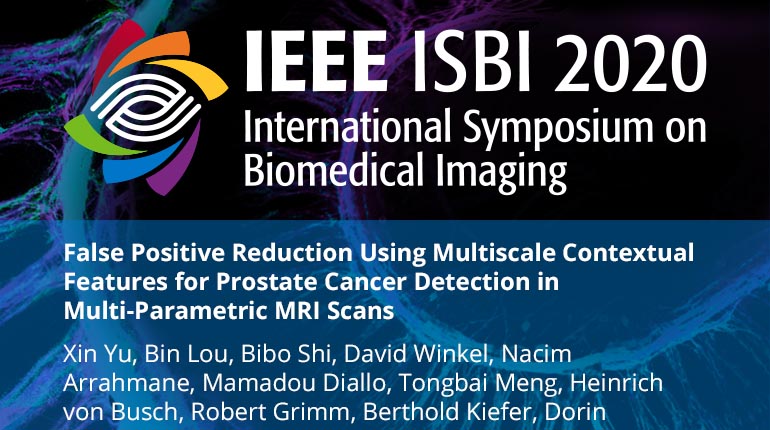
Already purchased this program?
Login to View
This video program is a part of the Premium package:
False Positive Reduction Using Multiscale Contextual Features for Prostate Cancer Detection in Multi-Parametric MRI Scans
- IEEE MemberUS $11.00
- Society MemberUS $0.00
- IEEE Student MemberUS $11.00
- Non-IEEE MemberUS $15.00
False Positive Reduction Using Multiscale Contextual Features for Prostate Cancer Detection in Multi-Parametric MRI Scans
Prostate cancer (PCa) is the most prevalent and one of the leading causes of cancer death among men. Multi-parametric MRI (mp-MRI) is a prominent diagnostic scan, which could help in avoiding unnecessary biopsies for men screened for PCa. Artificial intelligence (AI) systems could help radiologists to be more accurate and consistent in diagnosing clinically significant cancer from mp-MRI scans. Lack of specificity has been identified recently as one of weak points of such assistance systems. In this paper, we propose a novel false positive reduction network to be added to the overall detection system to further analyze lesion candidates. The new network utilizes multiscale 2D image stacks of these candidates to discriminate between true and false positive detections. We trained and validated our network on a dataset with 2090 cases from seven different institutions and tested it on a separate independent dataset with 243 cases. With the proposed model, we achieved area under curve (AUC) of 0.876 on discriminating between true and false positive detected lesions and improved the AUC from 0.825 to 0.867 on overall identification of clinically significant cases.
Prostate cancer (PCa) is the most prevalent and one of the leading causes of cancer death among men. Multi-parametric MRI (mp-MRI) is a prominent diagnostic scan, which could help in avoiding unnecessary biopsies for men screened for PCa. Artificial intelligence (AI) systems could help radiologists to be more accurate and consistent in diagnosing clinically significant cancer from mp-MRI scans. Lack of specificity has been identified recently as one of weak points of such assistance systems. In this paper, we propose a novel false positive reduction network to be added to the overall detection system to further analyze lesion candidates. The new network utilizes multiscale 2D image stacks of these candidates to discriminate between true and false positive detections. We trained and validated our network on a dataset with 2090 cases from seven different institutions and tested it on a separate independent dataset with 243 cases. With the proposed model, we achieved area under curve (AUC) of 0.876 on discriminating between true and false positive detected lesions and improved the AUC from 0.825 to 0.867 on overall identification of clinically significant cases.
 Cart
Cart Create Account
Create Account Sign In
Sign In





